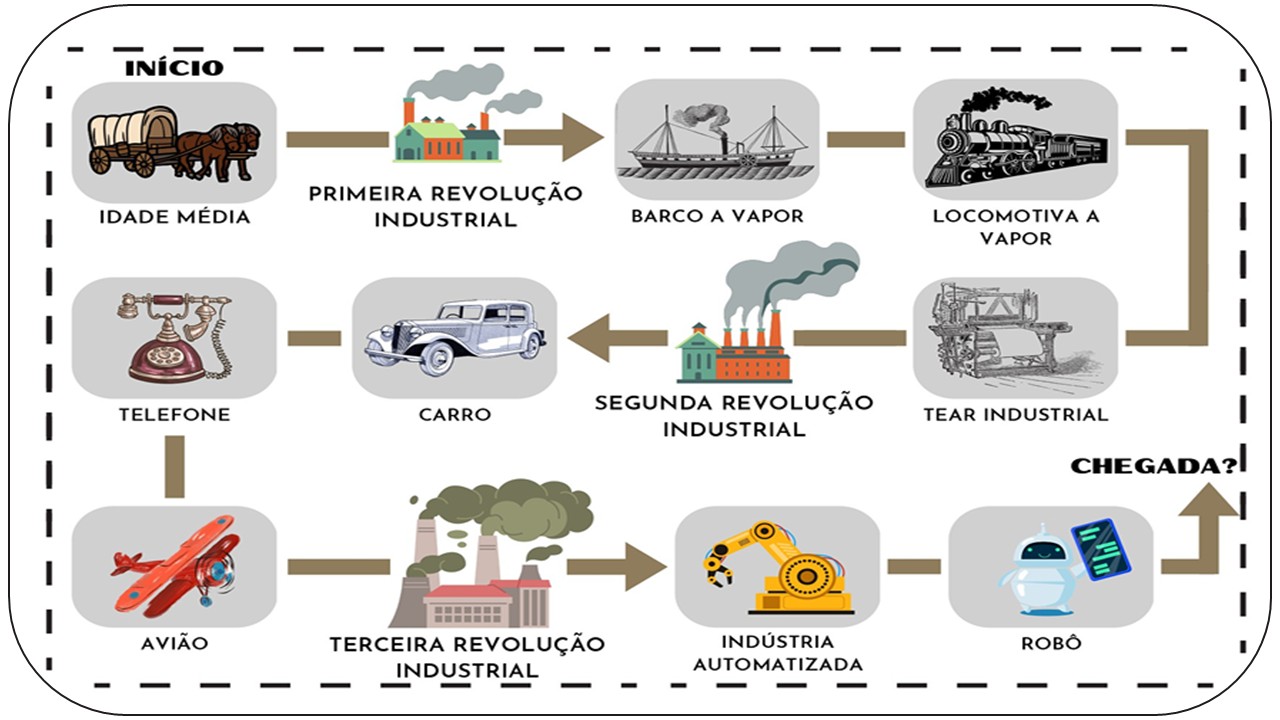Didactic sequence on the impacts of the evolution of thermal machines: a perspective based on the freirean thematic approach

Downloads
- PDF (Español (España)) 317
- EPUB (Español (España)) 70
- VISOR (Español (España))
- MÓVIL (Español (España))
- XML (Español (España)) 77
DOI
https://doi.org/10.25267/Rev_Eureka_ensen_divulg_cienc.2025.v22.i1.1202Info
Abstract
The evolution of thermal machines has driven significant transformations in society throughout human history, impacting, both positively and negatively, people’s lives and the planet as a whole. Teaching these impacts is essential for students to develop critical-reflective capacities on the subject, as the evolution of thermal machines and their consequences remain relevant to contemporary daily life. This study aims to evaluate the potential of employing the "three pedagogical moments" framework for teaching the impacts of thermal machine advancements and their related technologies, particularly in fostering the construction of critical-reflective arguments grounded in scientific reasoning. The research involved 20 students from a public school in Belém, Brazil. The results demonstrated that the dynamics of the three pedagogical moments hold promising potential for achieving the proposed objective, enabling students to cultivate critical reflective argumentation skills, supported by scientific evidence, regarding the societal and environmental impacts of thermal machine evolution and associated technologies.
Keywords
Downloads
Supporting Agencies
How to Cite
License
Copyright (c) 2024 José Antônio de Souza Amador, Tania Madeleine Begazo Valdivia, Mayara Larrys Gomes de Assis Nogueira

This work is licensed under a Creative Commons Attribution-NonCommercial 4.0 International License.
Require authors to agree to Copyright Notice as part of the submission process. This allow the / o authors / is non-commercial use of the work, including the right to place it in an open access archive. In addition, Creative Commons is available on flexible copyright licenses (Creative Commons).

Reconocimiento-NoComercial
CC BY-NC
References
Adúriz-Bravo, A. e Izquierdo-Aymerich, M. (2009). A research-informed instructional unit to teach the nature of science to pre-service science teachers. Science & Education, 18(1), 1177-1192. https://link.springer.com/article/10.1007/s11191-009-9189-3
Aikenhead, G. (1994). What is STS Science Teaching. In: J. Solomon, G. Aikenhead (Eds.). STS education: International perspectives on reform (pp. 47-59). Teachers College Press.
Andrade, R. O. (2019). A chegada dos carros voadores. Revista Pesquisa FAPESP. Engenharia Aeronáutica, 286, 68-73. https://revistapesquisa.fapesp.br/a-chegada-dos-carros-voadores/
Bardin, L. (2011). Análise de conteúdo. Edições 70.
Benedicto, E. C. P. (2013). Humor no Ensino de Química. Disertación (Maestría en Química Analítica e Inorgánica). Universidade de São Paulo. https://www.teses.usp.br/teses/disponiveis/75/75135/tde-24022014-114947/publico/ErikCeschiniPanighelBenedicto_Revisado.pdf
Brasil (2018). Ministério da Educação. Secretaria de educação básica. Base Nacional Comum Curricular. Educação é a base. MEC/CONSED/UNDIME. https://basenacionalcomum.mec.gov.br/
Cavalheiro, D. N. y Fernandes, C. S. (2021). A contextualização histórica na área das ciências da natureza e suas tecnologias na base nacional comum curricular (bncc). Anais do XIII Encontro Nacional de Pesquisa em Educação em Ciências. Realize Editora. https://www.editorarealize.com.br/index.php/artigo/visualizar/76591
Delizoicov, D. y Angotti, J. A. (1994). Metodologia do Ensino de Ciências. Cortez.
Delizoicov, D., Angotti, J. A. y Pernambuco, M. M. C. A. (2011). Ensino de Ciências: fundamentos e métodos. 4 ed. Cortez.
Dias-da-Silva, C. D., Souza, R. G., Almeida, R. G., Silva, G. F. y Almeida, L. M. (2018). Abordando o sistema respiratório em uma perspectiva dos três momentos pedagógicos. carpe diem: revista cultural e científica do unifacex, 16(1), 29-43. https://periodicos.unifacex.com.br/revista/article/view/924
Farias, L. M. y Sellitto, M. A. (2011). Uso da energia ao longo da história: evolução e perspectivas futuras. Revista Liberato, 12(17), 7-16. https://revista.liberato.com.br/index.php/revista/article/view/164/154
Fazenda, I. C. (1998). Didática e Interdisciplinaridade. Papirus.
Ferreira, M. V., Paniz, C. M. y Muenchen, C. (2016). Os três momentos pedagógicos em consonância com a abordagem temática ou conceitual: uma reflexão a partir das pesquisas com olhar para o ensino de ciências da natureza. Ciência e Natura, 38(1), 513-525. https://periodicos.ufsm.br/cienciaenatura/article/download/18951/pdf/99761
Freire. P. (1996). Pedagogia da Autonomia - Saberes necessários à prática educativa. Paz e Terra.
Freire. P. (2001). Pedagogia do oprimido. Paz e Terra.
Godoy, L. P. (2018). Ciências: vida e universo: 7º ano: ensino fundamental: anos finais. Unidade 1. Tema 2. Adaptado. 1 ed. Livro Didático. FTD.
Haubenthal, W. R. y Führ, R. (2020). Impactos da tecnologia na quarta revolução industrial. VI CONEDU, 3(1), 1019-1033. https://editorarealize.com.br/artigo/visualizar/65440
Locatelli, A., Crestani, E. M. F. y Rosa, C. W. (2020). Os três momentos pedagógicos e a interdisciplinaridade no Ensino de Ciências da Natureza: análise de um curso de formação continuada. Revista Insignare Scientia, 3(1), 188-213. https://periodicos.uffs.edu.br/index.php/RIS/article/view/11137
Mariniak, M. R. y Hilger, T. R. (2021). A energia da BNCC: um ensaio sobre o ensino fundamental e o ensino médio. Revista de Enseñanza de la Física, 33(1), 119–126. https://doi.org/10.55767/2451.6007.v33.n1.33230
Matthews, M. (1994). Science teaching: the role of history and philosophy of science. Routledge.
Moraes, R. (2008). Aprender em rede na educação em Ciências. Unijuí.
Saint'Pierre, T. D. (2023). Arquímedes [Dispositiva docplayer]. https://docplayer.com.br/60005835-Arquimedes-tatiana-dillenburg-saint-pierre-este-documento-tem-nivel-de-compartilhamento-de-acordo-com-a-licenca-3-0-do-creative-commons.html
Sampieri, R. H., Collado, C. F. y Lucio, P. B. (2013). Metodologia de Pesquisa. McGraw Hill.
Schwab, K. y Davis, N. (2018). Aplicando a Quarta Revolução Industrial. Tradução de Daniel Moreira Miranda. Edipro.
Veiga, I. P. A. (2000). Técnicas de ensino: Por que não? Papirus.
Wiertel, W. J. (2016). Gamificação, Lúdico e Interdisciplinaridade como instrumentos de ensino. Instituto Latino-Americano de Arte, Cultura e História da Universidade Federal da Integração Latino-Americana.
Zanette, M. S. (2017). Pesquisa qualitativa no contexto da Educação no Brasil. Educar em Revista, 33(65), 149-166. https://revistas.ufpr.br/educar/article/view/47454/33236






